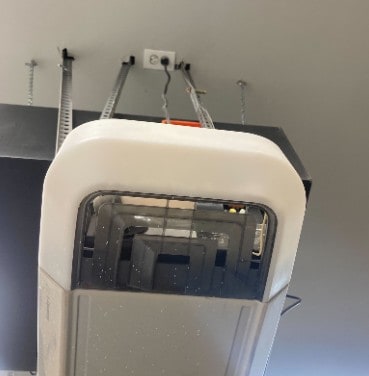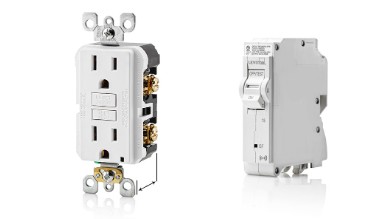
WARNING: ELECTRICITY CAN BE DANGEROUS AND COULD CAUSE SERIOUS INJURY, DEATH, OR DAMAGE TO PROPERTY IF THE PROPER SAFETY PRECAUTIONS ARE NOT ADHERED TO.
Does the Garage Door Opener need a Dedicated Circuit?
No, a garage door opener is not required to be on a separate, dedicated circuit. However, the ceiling receptacle outlet that it’s plugged into must be GFCI-protected. This leads to an additional requirement: since the reset for a GFCI device, either a GFCI-receptacle or circuit breaker must be readily accessible—which means below 6’-8” high—you cannot put a GFCI-receptacle with test/reset buttons on the ceiling.
So the garage ceiling receptacle must be protected by a GFCI-receptacle or GFCI-breaker upstream from it. Usually, the door opener is on the same circuit as the garage wall receptacles and one of them is GFCI.
Many older homes do not have GFCI receptacles. GFCI receptacles were required in houses starting in 1971. So if you have a home built before 1971 you most likely do not have GFCIs unless a previous homeowner had them installed.
What is a GFCI (Ground-Fault Circuit-Interrupter)?
These are special circuit breakers or receptacle outlets that are designed to break the flow of electricity in the event of a short circuit. When this occurs, (i.e., a short circuit) the GFCI outlets must be reset according to the manufacturer’s instructions.
Do not plug appliances such as air conditioners, freezers, timers, and refrigerators into GFCI outlets or circuits. The electrical surge that occurs when these appliances cycle will trip the GFCI circuit or outlets and break the circuit.
Should we use GFCI in Our Garage?
Yes, GFCI outlets are required for garage receptacles per the National Code requirements in section 210.8(B)8. An exception is for a dedicated receptacle for an electrical appliance like a refrigerator, freezer, air conditioning unit, major appliances etc. This receptacle should be on a separate circuit and not a GFCI.

Frequently Asked Questions (FAQs)
1. Can I Add GFCI to My Non-GFCI Garage Outlets?
Yes, you can add GFCI receptacles. The difficult part is determining where the ceiling outlet is connected upstream to correctly locate a GFCI receptacle for this outlet.
If only the electrical outlet are on a dedicated circuit, you can change the 20-amp breaker in the service panel to a GFCI 20-amp breaker. Otherwise, you need to determine which receptacle is the first in the series and change that receptacle to a GFCI.
This receptacle will provide feed through protection for all the ones downstream. Be sure to follow the directions included with the receptacle for proper connections of the wiring.
When looking for which receptacle is the first in line, remove the cover plate and unscrew the receptacle from the box. Pull it out. There should be 4 wires. If more than 4 wires, you cannot use this box and you should contact an electrician. See the Leviton video link here and below for installation instructions.
2. Can a garage door opener be on a 15-amp circuit?
No, it should not. The National Electrical Code (NEC) 210.11(C)(4) requires at least one 20-amp garage opener circuit for a dwelling unit garage, whether it is attached or detached from the home.
Similar to the requirements in the NEC for 120-volt, 20-amp circuit in the bathroom, laundry, and kitchen areas of a dwelling, now one is required for garages.
The intent of the code is to address the use of extension cords and plug-connected appliances and many portable tools that commonly draw 12 to 16 amps. This load is too much for the typical 15-amp branch circuit that frequently supplies the garage lighting outlet as well.
The last sentence of the code states that this garage circuit shall have no other “outlets”. This means anything besides garage receptacle-type outlets.
It would be a code violation to supply the garage lighting outlet from this branch circuit, but there is an exception to allow the circuit to also supply “readily accessible outdoor receptacle outlets”.
“Readily accessible outdoor receptacle outlets” are those receptacles that can be reached without using a portable ladder. Holiday lighting receptacles up under the eaves will most likely only be accessible rather than “readily accessible” and are not permitted on this circuit.
3. Are garage door openers hard-wired?
No. Openers should be plugged into an outlet and not hard-wired directly.
Other Articles Related to Garage Door Opener You May Find Useful: How do I Know if my Garage Door Opener Motor is bad? | How to Quiet a Garage Door Opener?
Contents
